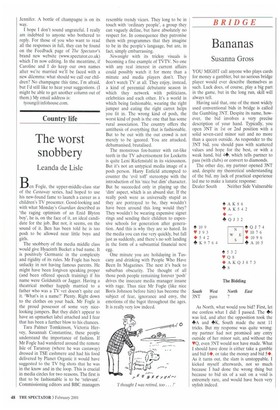The worst snobbery
Leanda de Lisle
Ben Fogle, the upper-middle-class star of the Castaway series, had hoped to use his new-found fame to launch a career as a children's TV presenter. Good-looking and with what Monday's Guardian described as 'the raging optimism of an Enid Blyton boy', he is, on the face of it, an ideal candidate for the job. But not, it seems, on the sound of it. Ben has been told he is too posh to be allowed near little boys and girls.
The snobbery of the media middle class would give Hyacinth Bucket a bad name. It is positively Germanic in the complexity and rigidity of its rules. Mr Fogle has been unlucky in not having famous parents. He might have been forgiven speaking proper (and been offered speech training) if his name were Goldsmith or Jagger. Having a theatrical mother happily married to a father who was a TV vet doesn't quite cut it. 'What's in a name?' Plenty. Right down to the clothes on your back. Mr Fogle is the proud possessor of some very nicelooking jumpers. But they didn't appear to have an upmarket label attached and I fear that has been a further blow to his chances.
Tara Palmer Tomkinson, Victoria Hervey, Susannah Constantine, these people understand the importance of fashion. If Mr Fogle had wandered around the remote Isle of Taransay (where he was castaway) dressed in TSE cashmere and had his food delivered by Planet Organic it would have suggested to the TV big shots that he was in the know and in the loop. This is crucial in media circles for two reasons. The first is that to be fashionable is to be 'relevant'. Commissioning editors and BBC managers resemble trendy vicars. They long to be in touch with 'ordinary people', a group they can vaguely define, but have absolutely no respect for. In consequence they patronise them with programmes that they imagine to be in the people's language, but are, in fact, simply embarrassing.
Newsnight with its tricksy visuals is becoming a fine example of TVTV. No one with any real interest in current affairs could possibly watch it for more than a minute and media players don't. They don't watch TV at all. They enjoy, instead, a kind of perennial debutante season in which they network with politicians, celebrities and each other. It's a world in which being fashionable, wearing the right jumper and eating the right carrot helps you fit in. The wrong kind of posh, the worst kind of posh is the one that has some rural association. The country offers the antithesis of everything that is fashionable. But to be out with the out crowd is not merely to be ignored. You are attacked, dehumanised, brutalised.
The monstrous fox-hunter with rat-like teeth in the TV advertisement for Locketts is quite Leni Riefenstahl in its viciousness. But it's not an untypical media image of a posh person. Harry Enfield attempted to counter the 'evil toff' stereotype with the introduction of his 'nice but dim' character. But he succeeded only in playing up the 'dim' aspect, which is an absurd slur. If the really posh were as universally stupid as they are portrayed to be, they wouldn't have been around this long would they? They wouldn't be wearing expensive signet rings and sending their children to expensive schools for generation after generation. And this is why they are so hated. In the media you can rise very quickly, but fall just as suddenly, and there's no soft landing in the form of a substantial financial nest egg.
One minute you are holidaying in Tuscany and drinking with People Who Have Been In Magazines. The next it's back to suburban obscurity. The thought of all those posh people remaining forever 'posh' drives the insecure media manager insane with rage. Thus nice Mr Fogle (like nice Boris Johnson before him) has become the subject of fear, ignorance and envy, the emotions of the bigot throughout the ages. It is really very low indeed.


























































 Previous page
Previous page